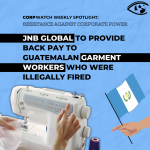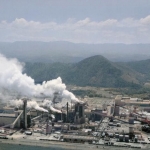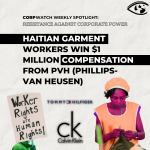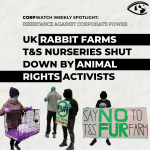Migrant Workers in Mauritius Win Over US$400,000 in Compensation From Barbour and PVH
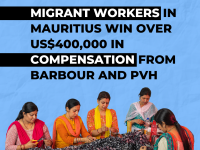
Victory for Migrant Workers in Mauritius
Transparentem, a human rights NGO, published accounts of abuses among migrant workers at garment factories on the island of Mauritius. Fashion brands Barbour and PVH (makers of Calvin Klein and Tommy Hilfiger clothes) agreed to pay US$420,593 in compensation to workers at a factory operated by R.E.A.L Garments, who say they were charged illegal recruitment fees to get their jobs.
“If a migrant worker dares to denounce their employer for ill treatment or abuse, they are deported overnight. Either you adapt or perish. The success behind this victory lies in the naming and shaming campaign that the CTSP launched at [a] global level.” - Reeaz Chutto, president of Confédération des Travailleurs des Secteurs Publique et Privé (CTSP)
Migrant Workers in Mauritius
Over 50,000 migrants from Bangladesh, India, Madagascar, Nepal and Sri Lanka are employed in Mauritius. Many take out loans to pay recruitment agencies thousands of dollars to get jobs in industries like construction and textiles. The agencies often charge exorbitant interest rates forcing workers into years of debt bondage, according to Anti-Slavery International.
R.E.A.L. Garments
R.E.A.L Garments is a factory with over 1,200 workers in Pointe aux Sables, Mauritius. The company claims to make two million pieces of denim a year and has a turnover of 804 million Mauritian rupees a year. (US$18 million) Some of their customers include Barbour, Diesel, PVH (which owns Calvin Klein and Tommy Hilfiger), Rodd & Gunn, and Second Clothing.
Findings
Interviews by Transparentem, a U.S.-based watchdog of workers’ rights abuses, with 14 workers at R.E.A.L Garments plus another 40 from factories owned by Aquarelle Clothing, Denim de I’Ile and Firemount Group, uncovered tales of illegal recruitment fees, abusive working conditions, lack of access to clean drinking water, as well as bedbug and cockroach infestations in living quarters.
“If I had any idea or understanding of any of this, I would never work at this company. My mental state was severely bad. I just had this tension about when I was going to be free of this debt and go back to my family.” - “Ahmed” (a pseudonym for a Bangladeshi worker at R.E.A.L Garments, who paid US$11,500 in fees and loan interest for his job.)
Mixed Results
A total of 18 fashion brands that buy from R.E.A.L Garments and other factories in Mauritius (out of 25 identified by Transparentem) agreed to commission third party audits from Lloyd's Register Quality Assurance and Verité in late 2022. The auditors confirmed abusive working conditions but not high recruitment fees. Workers later told Transparentem that they did not feel comfortable telling the truth.
Compensation Paid
With support from local unions like Confédération des Travailleurs des Secteurs Publique et Privé (CTSP) and global unions like IndustriALL, Transparentem was able to name and shame the buyer companies. As a result PVH agreed to pay US$390,456, Barbour US$19,523, and Second Clothing US$10,614 in compensation to workers from R.E.A.L Garments.
Company Response
“As per findings from third party assessments, it was not reported that workers paid fees to sub agent officially/unofficially in the recruitment chain.” - R.E.A.L Garments response to Transparentem.
This is #77 in our series of Instagram infographics on resistance against corporate power.
Click here to see the full post on Instagram.
